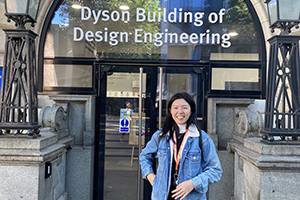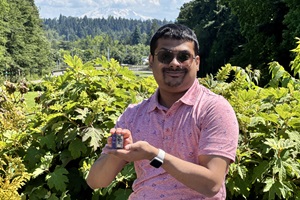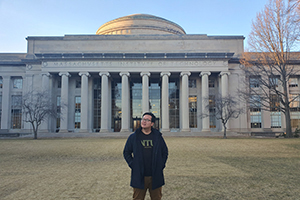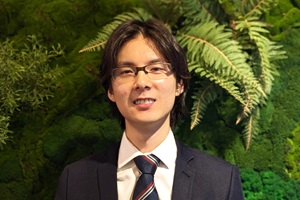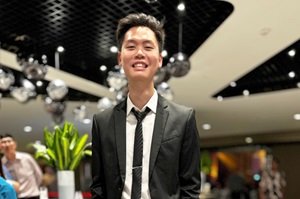Why ES?
- Tailor-made for university-bound students with a strong passion in applied science and engineering, this unique course has a strong focus on mathematics, physics and computing
- Acquire in-demand skills for the future economy by specialising in AI for Autonomous Systems, Data Analytics & Security, Operational Technology Cybersecurity New or Space Technology New
- Develop valuable applied R&D experience at local universities and research institutes that will build your expertise and network
- Opportunities to secure prestigious scholarships from PSC, A*STAR, DSO and DSTA!
About ES
You’re passionate about engineering applications, but
also love the sciences. You’re strong in both maths and
physics. You enjoy scientific research and discovering
new ways to solve problems. How about honing
all these interests through our top-notch Diploma
in Engineering Science (ES), whose students have
topped NP’s graduating cohorts and secured places in
prestigious university programmes?
The unique ES diploma prepares you well for a wide
range of degrees and careers in fields such as artificial
intelligence and machine learning; computer, electrical,
electronic and mechanical engineering; as well as data
analytics.
During the first two years, you will be equipped with a strong foundation in engineering and related domains such as mathematics, physics, computing and applied science.
In your third year, you can choose between four exciting specialisations to deepen your knowledge in emerging technologies:
- AI for Autonomous Systems
Develop the skills to create autonomous system solutions for the transportation sector. Explore AV technology and gain hands-on experience with smart urban mobility projects. - Data Analytics & Security
Master big data and build expertise in data analytics and security management for cloud platforms — skills that are highly sought after in today’s digital landscape.
- Operational Technology Cybersecurity New
As new-gen engineers, be equipped with domain-specific cybersecurity competencies to support vunerabilities in the future workforce.
- Space Technology New
Gain skills in areas like satellite design and systems engineering to meet the increasing demand across aerospace and smart infrastructure sectors.
Alternatively, you can opt for:
- Industry Immersion Pathway New
Gain real-world experience and expand your professional network as you take on a one-year internship or project with one of our renowned partner organisations
- University Pathway ProgrammesNew
Start your uni studies ahead of your peers, thanks to our University Pathway Programmes with NUS and SUTD! Both pathways let you read uni modules, allowing you to earn credits that count towards your future degree with either of two prestigious unis!
A key highlight of ES is early exposure to and
immersion in a university environment. As early as the
first semester in Year 3, you will spend half a day per
week at local universities, working on applied industrial
or R&D projects under the guidance of university
faculty.
These projects can be extended into your final-year
project, where you will explore cutting-edge research
and technology innovations to enhance your portfolio.
Choose from a wide variety of topics, including artificial
intelligence, autonomous vehicles, the Internet of
Things, robotics, green energy, and material science.
Overview of Your ES Journey
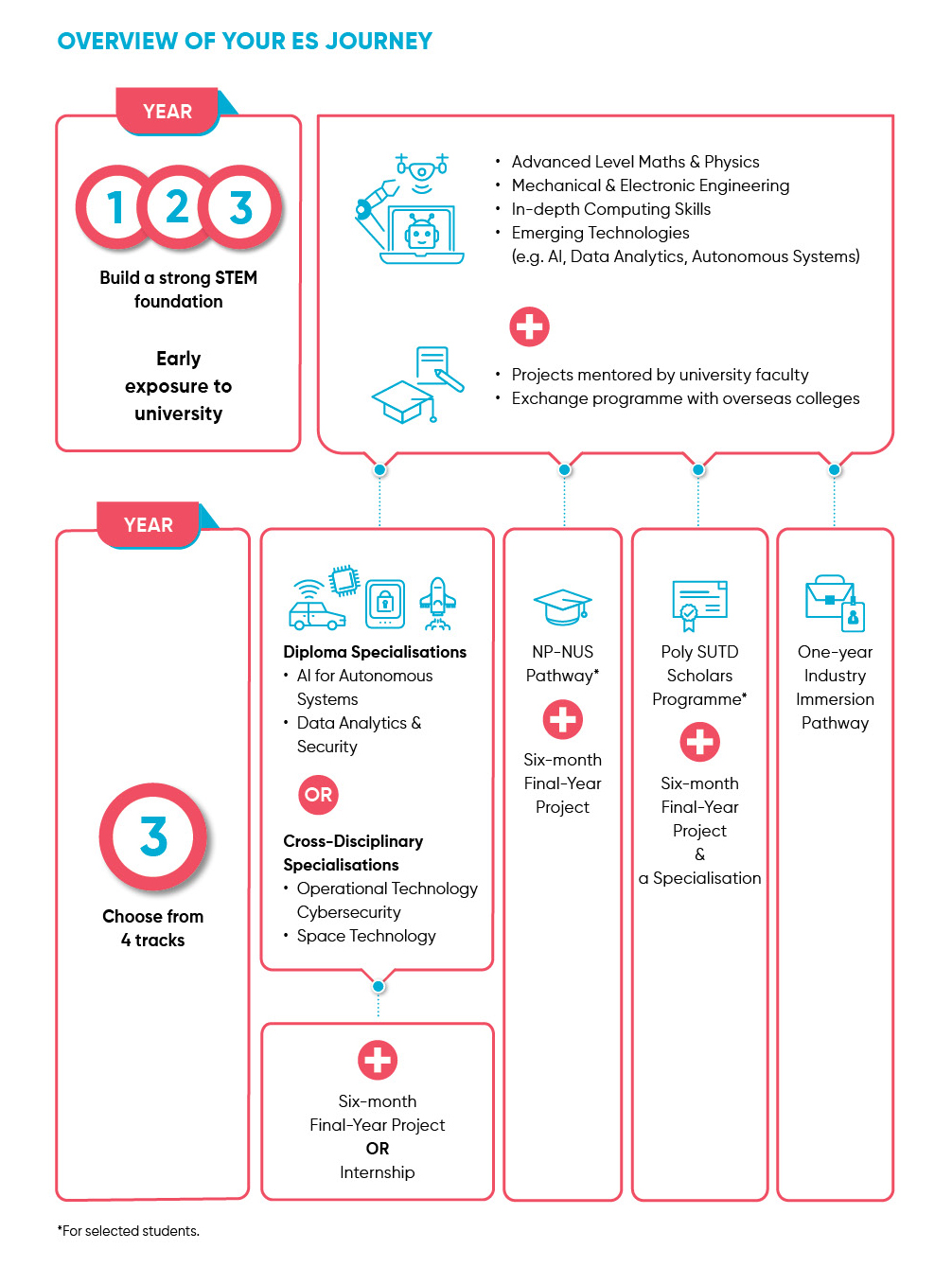
Highlights
Fast track to a degree via the University Pathway Programmes with NUS and SUTD
Get a head start and experience university life – even as an NP student!
With the University Pathway Programmes* at NUS and SUTD, you will be on the fast track to a Bachelor’s degree by earning credits toward your future degree at either of these prestigious universities while studying at NP. Level up your knowledge with humanities and science modules taught by NUS and SUTD faculties. These are taken alongside your own curriculum, so you will emerge as a multi-skilled professional. But that’s not all. Top off your university experience by working on cutting-edge research projects with NUS and SUTD professors and researchers as your mentors!
*for selected students only
Further Studies
Both NTU and NUS recognise ES for a wide range of
their degree programmes. SUTD offers conditional
admission for students in the NP-SUTD Pathway,
along with module exemptions for ES graduates.
NUS provides early admission for selected ES students
as early as Year 2 and allows them to take NUS
modules during their studies at NP, earning additional
credit exemptions. With your strong ES foundation, you
can also apply for a variety of degree programmes at
overseas universities.
If you’re looking for an Engineering diploma that attracts the brightest minds, look no further!
- >10 ES graduates topped their cohorts to clinch the Ngee Ann Kongsi Gold Medal or Lee Kuan Yew Award since 2014
- >10 ES students received NP as well as external scholarships (e.g. A*STAR Science Award (Poly), CSIT Diploma Scholarship, DSTA Polytechnic Scholarship, DSO Diploma Scholarship) which offer R&D internship opportunities
- >80% ES graduates offered admission into prestigious local and overseas universities
THEY CHOSE ES AND ARE GOING PLACES!
Careers
Armed with an ES diploma, you will enjoy good career prospects in areas such as research & development, product design and development, strategist and manufacturing and services.
Entry Requirements
AGGREGATE TYPE ELR2B2-C
To be eligible for consideration, candidates must have the following GCE ‘O’ Level examination (or equivalent) results.
| Subject | 'O' Level Grade |
|---|---|
| English Language | 1-7 |
| Additional Mathematics/Mathematics | 1-6 |
| Any one of the following subjects: Biology Biotechnology Chemistry Computing/Computer Studies Design & Technology Electronics/Fundamentals of Electronics Physics Science (Chemistry , Biology) Science (Physics, Biology) Science (Physics, Chemistry) | 1-6 |
Applicants must also fulfil the aggregate computation requirements for the ELR2B2-C Aggregate Type ( English Language, 2 relevant subjects and 2 other best subjects) listed at www.np.edu.sg/docs/ELR2B2.pdf.
For students with other qualifications, please refer to the NP website for the entry requirements and admissions exercise period.
Candidates with colour vision deficiency, severe vision deficiency, profound hearing deficiency, uncontrolled epilepsy and/or severe physical impairments may encounter difficulties meeting the course requirements and expectations.
What You Will Learn
Applied Mathematics 1
This module aims to provide students with the fundamental skills in applying mathematics to solve engineering problems. The emphasis of the teaching and learning is on applications and problem solving.
Topics include analytic geometry, exponential & logarithmic functions, trigonometric functions, complex numbers & applications, differentiation & applications, basic integration & applications. Materials on MOOC platforms could
be adapted in module delivery.
Electrical Engineering Fundamentals
This module provides a foundation in electricity covering basic concepts of electrical circuits and the methods used to analyse them. The module emphasises
the understanding of the basic electrical circuit laws (Ohm’s Law, Kirchhoff’s Voltage and Current Laws) and network theorems, and their application to electrical network analysis. Topics covered include fundamentals of electricity, network
theorems, capacitance, electromagnetic induction and inductance, AC waveform and transformer fundamentals.
Mechanical Engineering Fundamentals
This module introduces students to the study of external forces in two dimensions
and their effect on particles and rigid bodies that are at rest and at simple linear motion. Students learn the knowledge and skills to analyze the forces acting on the bodies by drawing free-body diagrams and applying the conditions of equilibrium. This
module also aims to equip students with the skills to analyze problems of rigid bodies in two dimensions linear motion. Topics include forces and resultants, moments and couples, equilibrium, plane friction, kinematics and kinetics of linear motion.
Programming
This practice-oriented module equips students with basic knowledge and skills in computer programming using a suitable high-level language. The main topics include basic computer programming concepts and fundamental programming
constructs such as sequences, selection, and repetition.
Career & Engineering Professional Preparation
This module aims to give students a head-start in their professional careers as they transit into a polytechnic
engineering education. The module will equip students with knowledge and skills that can help them chart, navigate and advance in their individual education and career pathways. Students will be guided in adopting a design thinking approach towards making
their education and career plans. They will be exposed to career-centric self-assessment tools and online resources. As part of our efforts to help students benefit from the ubiquity of a professional online presence, students will also establish their
online professional brand by showcasing their marketable knowledge, skills and competencies.
To kickstart our students personal and professional development, the module will also impart various knowledge and skills, such as, cultural
intelligence, financial literacy, digital literacy, industry networking and safety. The topic on safety will be taught according to the Competency Unit “Develop a Risk Management Implementation Plan” from the Singapore Workforce Skills Qualifications
(WSQ) National Competency Standard. To augment this qualification, students will participate in industry engagements and service projects to glean the importance of safety in the engineering profession and societal context.
Innovation
Made Possible^
This module aims to help students discover and hone their innate ability to think creatively and come up with innovations to tackle problems close to their hearts. Underpinned by the Design Thinking framework, students
will be sensitized to the process of user-centric problem solving. They will be introduced to concepts such as empathy, problem-definition, ideation, prototyping and testing through a practical approach featuring engaging out-of-classroom activities,
just-in-time master-classes and a hands-on, “learning by doing” delivery format. Ultimately, the module will help students recognize that innovation is attainable and fun and develop creative confidence to explore new ideas in their studies
and beyond.
English Language Express^*
^* For selected students only
^Critical Core modules account for 13 credit units of the diploma curriculum. They include modules in communication, innovation and world issues, as well as an interdisciplinary project. By bringing students from diverse diplomas together, the interdisciplinary project fosters collaboration to explore and propose solutions for real-world problems. NP aims to develop students to be agile and self-directed learners, ready for the future workplace.
Applied Mathematics 2
This module aims to provide students with the fundamental skills in applying mathematics to solve engineering problems. The emphasis is on applications and problem solving. Topics
include further techniques of differentiation and integration and their applications, ordinary differential equations, Laplace transform and applications, vectors and linear equations, matrices and applications. Materials on MOOC platform could be adapted
in the module delivery.
AC Circuits
This module equips students with foundational knowledge of electric circuit analysis, focusing on alternating current (AC) systems. Key DC network theorems are extended to AC circuits,
where impedance due to capacitance and inductance is introduced. Students will learn to analyse AC circuits in series, parallel, and series-parallel configurations, gaining a solid understanding of AC power and the role of power factor. The module emphasises
the importance of power factor correction in improving energy efficiency and minimising electrical losses. Students will be able to apply theoretical concepts to practical AC circuit analysis and understand their relevance in real-world electrical systems.
Digital Fundamentals
This module introduces the basic concepts of digital systems. It covers the basics of combinational and sequential logic circuits. Flip-flops and their application in counters and registers will also be discussed.
This basic knowledge is essential for students to be able to understand, analyse, and design basic digital circuit system.
Analogue Electronics
The aim of this module is to lay the foundations
in analogue electronics. At the end of this module, students will acquire content knowledge and understanding on the basic concepts of analogue electronics and some applications. Key topics covered
in this module include operating characteristics, working principles and applications of discrete electronic devices such as various types of diodes,
MOSFETs and BJTs. Practical circuits will be used to enhance and strengthen the learners’ knowledge so that they will acquire the
relevant competencies to move on to more specialized modules.
Fundamental Electronic and Electrical Skills
This module aims to integrate the knowledge learnt in the semester and understand the relevance and application of the
modules learnt. Students will work in teams and undertake the projects/case studies underpinned by the design thinking and electronics prototyping using a microcontroller. On completion of the module, students will be able to apply the skills and develop
confidence in tackling projects at the higher levels.
Confident Communication: Find Your Voice (VOICE)^
This module is designed to empower students to become thoughtful and confident communicators, while discovering
their personal voice in self-expression. It equips students with the skills to communicate with impact in a variety of settings, by tailoring their message to suit audience, purpose and context. Students will learn how to utilize storytelling structures
and techniques, persuasive strategies and effective visuals to connect meaningfully with their audience. The module also features a personalized growth plan that enables students to customize their learning experience according to their individual needs
and aspirations. Peer learning and coaching circles provide students the platform to practise their critical reasoning and presentation skills in a safe environment. Ultimately, the module encourages students to reflect on their communication habits and
develop practical strategies to enhance their effectiveness as communicators.
Health & Wellnes^
This module provides you with an opportunity to be active, keep fit and stay healthy through basic sports skill acquisition.
It also aims to enhance your social and psychological well-being through a variety of sports electives while taking you through the process of character development, choice and decision making.
^Critical Core modules account for 13 credit units of the diploma curriculum. They include modules in communication, innovation and world issues, as well as an interdisciplinary project. By bringing students from diverse diplomas together, the interdisciplinary project fosters collaboration to explore and propose solutions for real-world problems. NP aims to develop students to be agile and self-directed learners, ready for the future workplace.
This module introduces students to the fundamental of engineering materials and manufacturing process.Materials lab practice including tensile test, hardness test, and machining technology including turning, milling, laser cut, 3D printing, sheet metal, assembly will be conducted during lesson hour. Students will be learning most of the content in the laboratory or workshop. Individual student will have to work on a designed workpiece in each workshop and get familiarized with all manufacturing technology. In the lab practice lesson, individual student will have to do reflection and data analyze and practice on various kinds of materials testing and fabrication method. Safety and positive work attitudes are inculcated in the student during training sessions.
Thermofluids
Thermofluids will provide students with a fundamental understanding of the 2 broad studies of fluid mechanics and thermodynamics. Students will learn the basic laws governing the behaviour of fluids under the influence of various energy transfer.Topics include systems concept, temperature and pressure, fluid statics, fluid in motion, continuity equation, laminar and turbulent flows, ideal incompressible flow, Bernoulli’s equation, the first law of thermodynamics, properties of perfect gas and non-flow process with perfect gas. Students will also go through a simple case study of turbomachinary: pumps. By applying the thermofluid concepts, solve, understand and perform basic sizing for pumps.
Object Oriented Programming
This module introduces object-oriented programming to students who already have a foundation in procedural programming. It covers the fundamental concepts of object-oriented programming with introduction to basic web and database applications.
Physics 1
This module introduces the fundamentals of physics in four main areas of classical mechanics: Kinematics, Newton’s Laws of Motion, Energy and Work, and Linear Momentum. The topics are covered to equip students with the foundations essential for the study of more advanced topics of physics. Concepts are introduced through mathematical models to facilitate a deeper understanding of the laws of nature. Derivations are given where possible to enable students to grasp the ideas behind principles of physics for applications to common phenomena and scenarios.
This module introduces students to contemporary design thinking focused on preserving the natural environment through sustainable practices. It emphasises resource efficiency, the use of eco-friendly materials, and innovative products and processes such as lean operations, remanufacturing, and responsible sourcing. A central focus is on addressing climate change, with students learning about carbon footprints, carbon emission calculations, and decarbonisation efforts. The module highlights the local and global engineering industry's approaches to sustainability.
World Issues: A Singapore Perspective (WISP)^
The module will expand on the awareness of contemporary issues introduced in the communication module in Year 1 and allow for a continued engagement with real world issues in Year 2 while preparing them for the Year Interdisciplinary project. Students will be asked to examine issues from various perspectives so as to better appreciate the dynamism of real-world problems and their role as active citizens in society. Experiential learning will continue to be the key pedagogical approach with more game-based learning included to further engage students. WISP will also continue to be the main mode of delivering Character & Citizenship Education in NP.
^Critical Core modules account for 13 credit units of the diploma curriculum. They include modules in communication, innovation
and world issues, as well as an interdisciplinary project. By bringing students from diverse diplomas together, the interdisciplinary
project fosters collaboration to explore and propose solutions for real-world problems. NP aims to develop students to be agile
and self-directed learners, ready for the future workplace.
Applied Mathematics 3
This module aims to cover mathematical techniques for the applied fields of artificial intelligence, machine learning and data analytics/science. Topics include multi-variable
functions and gradient vectors, elementary set theory, proposition logics, probability distributions, conditional probability and Bayes’ law, linear spaces, eigenvalues and eigenvectors, matrix diagonalization, dimensional reduction and principal
component analysis. Examples in the relevant fields will be used to illustrate the applications of these mathematical skills.
System Modelling & Control
Mechatronic systems encompass electronics and software
to enhance the performance of mechanical systems, and often involve the application of sensors, processors and actuators in closed-loop control. The module aims to give students in the Automation & Mechatronic Systems course a firm foundation in the
physical principles involved in the modelling of dynamic systems, the analysis of systems responses, and the application of control principles to produce systems that meet performance specifications.
Microcontroller &
Interfacing
This module aims to equip students with a basic foundation in microcontroller and Embedded System. Students will acquire the necessary skills and knowledge through meaningful practical exercises and other module activities.
The knowledge and skills that the students acquire in this module will enable them to implement a microcontroller-based system.
Data Structure & Algorithms
This module introduces data structures and algorithms to students who already have knowledge of object-oriented programming. Data structures are ways to store and organize data for efficient access and modification. Algorithms are step-by-step procedures for solving computational problems involving data stored in appropriate data structures. DSAG teaches students how to choose or design appropriate data structures and algorithms for various computational tasks, forming the foundation for writing correct and efficient software.
Physics 2
This module introduces the fundamentals of physics in four core areas: Simple Harmonic Oscillations, Universal Gravitation, Electricity, and Magnetism. These topics are essential for the study and understanding of more advanced fields of physics and engineering and are pre-requisites of many university programmes in STEM. The mathematical approach will be taken to help students grasp a deeper understanding of the abstract concepts and laws behind known physical phenomena. They need to demonstrate mastery of these principles by applying them to solving problems in given scenarios.
Common Module
AI & Machine Learning
This module aims to introduce artificial intelligence (AI) with a strong focus on machine learning (ML). Students will learn about the various libraries used
in Python for machine learning, as well as the fundamental principles of some common machine learning algorithms. It is integrated with industrial curriculum such as the Amazon Web Services (AWS). On completion of the module, students
will be able to apply the skills and develop confidence in tackling projects at the higher levels.
Project ID - Connecting the Dots^
This module aims to prepare students for an increasingly globalized and interconnected
world where problems are multi-faceted and require interdisciplinary research and collaboration to solve. Using a project-based learning approach, students will have the opportunity to work in a multi-disciplinary team to investigate and propose comprehensive
recommendations for a pressing real-world problem affecting Singapore. They will be guided to step out of their disciplinary silos and effectively communicate and collaborate with peers from different backgrounds. Ultimately, the module seeks to develop
independent learning skills and the ability to synthesize diverse strands of knowledge to solve a complex problem, while impressing on students the importance of being a responsible global citizen.
^Critical Core modules account for 13 credit units of the diploma curriculum. They include modules in communication, innovation
and world issues, as well as an interdisciplinary project. By bringing students from diverse diplomas together, the interdisciplinary
project fosters collaboration to explore and propose solutions for real-world problems. NP aims to develop students to be agile
and self-directed learners, ready for the future workplace.
AI for Autonomous Systems Specialisation Modules
Computer Vision & Deep Learning
This module is aimed to equip students the knowledge and skills in computer vision for object detection and tracking, using the methods from image processing, feature extraction
to the modern deep learning models. We will learn the fundamental of machine learning and deep learning, especially in the design of neural networks. Students will understand the workflow of deep learning from data preparation, model training to performance
evaluation. The framework software for machine learning and deep learning will be introduced.
Autonomous Systems & IoT
This module will introduce students to the skills and components required to build and
operate an autonomous robot, which is capable of navigating its environment safely and efficiently. Students will acquire hands-on experience and knowledge on the mechanical build, electrical circuitry, and software programming required for the development
of the autonomous robot. Students will also have the opportunity to use the autonomous robot platform to develop internet of things (IoT) solutions.
Design Project in AI
This module provides students an opportunity
to work on university-linked industrial projects in AI with thematic sectors (e.g. sustainability, urban solutions, healthcare). Students will get to scaffold their learning and apply their knowledge and skills learnt from their specialization into
this module. Students learn to perform literature review, testing of hypothesis, designing of proposal and finalizing their architecture concepts in this design project. Through this module, students will have an opportunity to experience real-world
AI challenges and how AI can assist in or enhance solutioning for specific thematic sectors. In addition, student will get a chance to interface with local universities co-supervised by industry / university faculty mentors. The module serves
as a stepping stone to prepare students for their Final Year Projects.
Data Analytics & Security Specialisation Modules
Data Analytics & Cloud Fundamentals
This module introduces cloud computing concepts, providing an overview of core cloud services, security, architecture, pricing, and support. It also
covers gathering, cleaning, and manipulating data to build data analysis solutions. Students will acquire knowledge and skills with AWS services that are critical for conducting analysis of big data problems by using statistical tools and visualization
technologies.
Data Security & Blockchain
This module covers management and administration of Information Security. Concepts include security threats, security incidents, risk assessment and mitigation, information security
policy, procedures, guidelines and standards, security engineering, physical security and configurations and administrations of current OS systems. The module also provides an overview of blockchain technology, and its transformative impact
and use cases.
Design Project in Data Analytics
This module provides students an opportunity to work on university-linked industrial projects in Data Analytics with thematic sectors (e.g. digital economy, manufacturing,
connectivity). Students will get to scaffold their learning and apply their knowledge and skills learnt from their specialization into this module. Students learn to perform literature review, testing of hypothesis, designing of proposal and finalizing
their architecture concepts in this design project. Through this module, students will have an opportunity to experience handling large data, identify trends and working on algorithms to assist in or enhance solutioning for specific thematic sectors
in real-world scenarios. In addition, student will get a chance to interface with local universities co-supervised by industry / university faculty mentors. The module serves as a stepping stone to prepare students for their Final Year Projects.
Space Technology Specialisation Modules
Satellite Systems Design and Engineering
This module provides a specialised study of satellite engineering and space systems design. Students will gain a deep understanding of orbital mechanics, the space environment, and the
subsystems essential to satellite operation, including power, thermal control, communications, and attitude determination and control. Beyond spacecraft design, the module examines the environments in which satellites are built and launched, addressing
ground infrastructure, cleanroom and testing facilities, launch vehicles, and the regulatory frameworks that govern access to space. Emphasis is placed on applying systems engineering methods to mission analysis and design, preparing students
for advanced research or professional practice in the global space industry.
Capstone Project: CanSatellite
This capstone module provides students with a unique opportunity to engage in the end-to-end development of a CanSatellite, a miniature satellite housed within the volume and shape of a soda can.
Designed to closely mimic the development, integration, testing, and validation phases of an actual satellite bus system, the project simulates industry-standard practices.
Working in multidisciplinary teams, students will design, fabricate, test, and qualify a fully functional CanSatellite that meets specified mission requirements. The experience includes iterative reviews and real-world constraints, culminating in a flight test and post-mission analysis. Emphasis is placed on systems engineering, cross-functional collaboration, and engineering documentation.
Operational Technology Cybersecurity Specialisation Modules
Industrial Automation
This module aims to equip students with the basic knowledge of automation technologies and their applications in the manufacturing and process industries. With the rise of new digital industrial technology,
known as Industry 4.0, students will also be introduced to smart sensors and actuators using IO-Link technology. This technology enables communication within the system (host controller) down to the sensor level.
Major topics include electro-pneumatics technology, programmable logic control and IO-Link technology. The essential hardware components used in automated systems, such as sensors, valves and actuators will be applied to the automated systems. Widely accepted industrial control programming language ladder and inline structured text will be covered, in conjunction with the learning of programming logic controllers and computer interfaces.
Laboratory work involves hands-on circuit construction and implementation using these various technologies and techniques, which enhances students’ understanding of the practical aspects of circuit designs.
Major topics include programming and commissioning of mechatronic systems using the IEC61131-3 standard and integrating machines to the IIoT network using OPC-UA and MQTT for data collection and control, which is part of Industry 4.0 Smart Factory.
Students will be taught theoretical knowledge and problem-solving techniques through lecturer-facilitated, hands-on activities and project work to ensure correct and safe machine operation.
Operational Technology Security
With Industry 4.0, the modern Industrial Control System (ICS) are facing more advanced threats from the Internet outside as a result of the Informational Technology/ Operational
Technology (IT/OT) convergence. Protecting them through Operational Technology (OT) cyber defense is an evolving field required to continually adapt cybersecurity strategies so as to maintain the safety and reliability of production operation.
This module aims to equip students with the knowledge of design, maintenance and protection functions within the Operational Technology (OT) environment. Using a case study of a simulated environment with Industrial Internet of Things Capability (IIoT) capability, the student perform activities with relevance to OT cybersecurity administration and maintenance in order to establish a secure OT environment. This includes performing asset discovery, managing vulnerabilities in existing OT systems, as well as performing access control management across OT systems and devices
In addition, the module also introduces the concept of industrial networking and various cyber security standards, protocols and frameworks and are knowledgeable in using various cybersecurity tools to perform their job accordingly.
Cyber Governance, Risk & Compliance
This module examines the relevant frameworks to ensure that information assets are protected within an organization. It includes the processes and policies for administering and managing a company’s IT systems that follow
the compliance framework. Concepts on risk management process, risk analysis and mitigation will also be introduced. Students will learn to evaluate risks against the company’s critical assets and deploy safeguards to mitigate them.
Control frameworks such as PCI (Payment Card Industry), ISO 17799/27002, and COBIT will be covered.
Year-Long Internship I
The Year-Long internship aims to enhance existing internships to enable a more structured applied-learning pathway co-supervised by company supervisors and polytechnic lecturers. Learning resources
such as learning guides and taskbooks would be purposefully designed to scaffold students’ learning throughout the year-long internship phase. The learning guides and taskbooks would cover the essential knowledge and comprise an inventory
of essential on-the-job tasks designed to cover all desired applied learning outcomes as part of the internship assessment. The contents of the learning guides and taskbooks will be jointly developed with the industry. Students would submit
a final report at the end of each semester and present what they have learned. Assessment would be conducted jointly by the school and company supervisors.
Final Year Project I
This year-long project
module is designed to provide students with practical, hands-on experience while developing skills and knowledge comparable to those gained through traditional structured modules. The module focuses on a comprehensive, real-world engineering
problem or innovation challenge, which students will work on from inception to completion in that semester.
Throughout the project, students will engage in research, design, analysis, prototyping, testing, and reporting, mimicking
the processes found in engineering disciplines. They will be required to apply theoretical knowledge from core subjects, solve complex problems. The project will encourage collaboration, critical thinking, and innovative problem-solving, simulating
industry practices and preparing students for professional engineering roles.
In this module, students work full-time on their final-year projects. Students will work on project titles ranging from system design and integration, research and development, computer applications, and others. Students will also be given training in relevant technologies and skills at the beginning of the programme to build their knowledge. They learn and apply project management to enable them to complete their projects in time. They work closely with their supervisors on research, design, implementation, problem solving, testing, and analysis of results, and modify the prototype to meet design requirements. They develop a good standard of technical skills in construction of systems or circuit boards and operating measuring instruments, equipment and tools. Project work cultivates a sense of positive work attitude, team spirit and co-operation among the students. They will also write the project reports, prepare for project presentations and project inspections. Students will have the opportunity to participate in projects at local universities, co-supervised by industry / university faculty mentors.
6-month Internship (Local/Overseas)
Internship is a module whereby students will be attached to sponsoring companies. During their internships, they will undertake projects assigned by the companies or be involved in operations or maintenance-related work. Student internships may be undertaken locally or overseas.
Year-Long Internship II
The Year-Long internship aims to enhance existing internships to enable a more structured applied-learning pathway co-supervised by company supervisors and polytechnic lecturers. Learning resources such as learning guides and taskbooks would be purposefully designed to scaffold students’ learning throughout the year-long internship phase. The learning guides and taskbooks would cover the essential knowledge and comprise an inventory of essential on-the-job tasks designed to cover all desired applied learning outcomes as part of the internship assessment. The contents of the learning guides and taskbooks will be jointly developed with the industry. Students would submit a final report at the end of each semester and present what they have learned. Assessment would be conducted jointly by the school and company supervisors.
Final Year Project II
This year-long project module is designed to provide students with practical, hands-on experience while developing skills and knowledge comparable to those gained through traditional structured modules. The module focuses on a comprehensive, real-world engineering problem or innovation challenge, which students will work on from inception to completion in that semester.
Throughout the project, students will engage in research, design, analysis, prototyping, testing, and reporting, mimicking the processes found in engineering disciplines. They will be required to apply theoretical knowledge from core subjects, solve complex problems. The project will encourage collaboration, critical thinking, and innovative problem-solving, simulating industry practices and preparing students for professional engineering roles.



